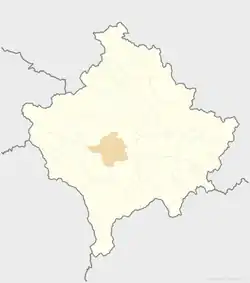Mališevo
Malishevë or Mališevo (Albanian: Malishevë, Serbian Cyrillic: Малишево) is a town and municipality located in the Prizren District of Kosovo.[lower-alpha 1] According to the 2011 census, the town of Malishevë has 3,395 inhabitants, while the municipality has 54,613 inhabitants.
Malishevë
| |
|---|---|
 Emblem | |
 Location in Kosovo | |
| Coordinates: 42°28′58″N 20°44′45″E | |
| Country | Kosovo[lower-alpha 1] |
| District | Prizren |
| Government | |
| • Mayor | Ekrem Kastrati |
| • Municipal | 306 km2 (118 sq mi) |
| Elevation | 538 m (1,765 ft) |
| Population (2011) | |
| • Urban | 3,395 |
| • Municipal | 54,613 |
| • Municipal density | 180/km2 (460/sq mi) |
| Time zone | UTC+1 (CET) |
| • Summer (DST) | UTC+2 (CEST) |
| Postal code | 24000 |
| Area code(s) | +381 |
| Car plates | 04 |
| Website | kk |
History
The population of the town has historically been predominantly ethnic Albanian. The town was largely destroyed by Serbian forces in 1998. Town residents only returned following the 1998 withdrawal of Serbian paramilitary police and military, in response to international pressures.[1]
The town became a stronghold for the ethnically Albanian Kosovo Liberation Army during the Kosovo War in 1999. The United Nations Interim Administration Mission in Kosovo (UNMIK) formally re-established the municipality of Malishevë in July 2000. During the war, a number of atrocities were committed by both Albanian and Yugoslav forces. One such incident occurred in Malishevë, the execution of no fewer than seven Serbian men, named the Mališevo Massacre. The UN-run Office on Missing Persons and Forensics began the excavations at the site in May 2005.
Demography
| Year | Pop. | ±% p.a. |
|---|---|---|
| 2011 | 54,613 | — |
| 2016 est. | 57,301 | +0.97% |
| Source: Division of Kosovo | ||
According to the 2011 census, Malishevë had a population of 54,613 inhabitants. The municipality has ethnic Kosovo Albanians majority (54,501; 99.8%). Based on the population estimates from the Kosovo Agency of Statistics in 2016, the municipality has 58,282 inhabitants.
Economy
Malishevë is home to the Tërpezë mine.
Notes
- The political status of Kosovo is disputed. Having unilaterally declared independence from Serbia in 2008, it is formally recognised as an independent state by 97 UN member states (with another 15 recognising it at some point but then withdrawing recognition), while Serbia continues to claim it as part of its own sovereign territory.
References
- Julius Strauss, "Albanian refugees nervously return to their Kosovo homes as Serbian troops pull out". Daily Telegraph via the National Post, October 28, 1998, p. A12.
External links
- kk.rks-gov.net/malisheve – Municipality of Mališevo
